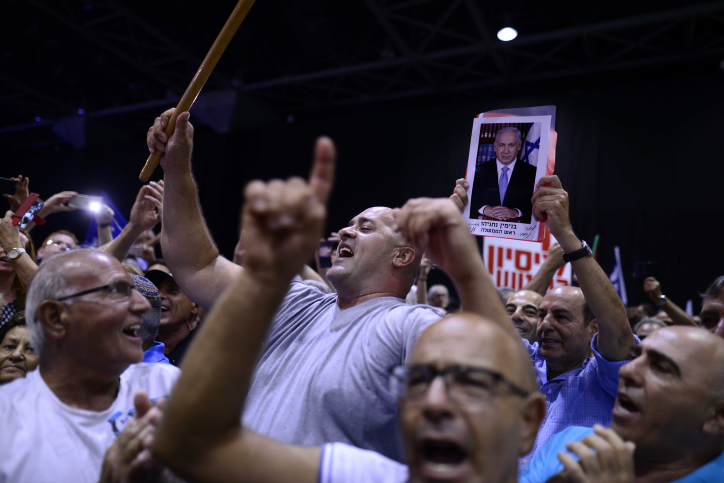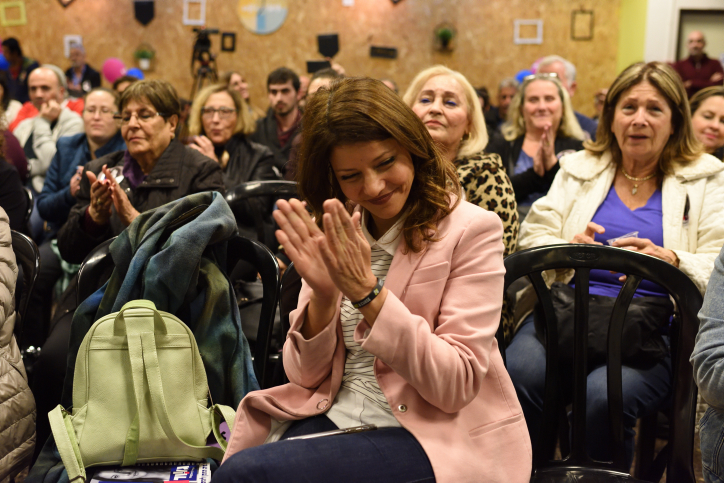Mizrahim, like much of the Jewish-Israeli public, are sinking into a kind of fortress nationalism. The key to change can be found in an alliance with the Palestinians.

After effectively destroying the Israeli Labor Party by leading it to an unprecedented low in the last elections, chairman Avi Gabbay announced on Thursday that he is quitting politics. Kulanu leader, centrist politician Moshe Kahlon, came crawling on all fours to Prime Minister Netanyahu after he too crashed in the elections. Orly Levy, who broke away from Avigdor Liberman’s right-wing Yisrael Beiteinu to form the centrist Gesher party, didn’t even make it past the election threshold.
The sun seems to have set on three of Israel’s most promising Mizrahi politicians. But do the election results signal the end of Mizrahi politics? Do Mizrahi politics even exist in the first place?
The Mizrahi issue in Israel finds itself in a difficult catch-22: it is a popular topic of heated public debate yet hardly makes a dent come election time. Mizrahi candidates usually view their ethnic background as an electoral asset as long as it helps them to be seen as “of the people” — one of the most exhausting tropes applied to Mizrahim.
Not only the poor
To be fair, Orly Levy’s story is slightly different. She managed to cobble together an excellent women-led, feminist list that included several veteran Mizrahi activists. But Levy is viewed as a Mizrahi politician mainly because she dedicates herself to social issues, which leads to yet another catch-22: the Mizrahi issue is widely seen as synonymous with issues of social class.

This identification, however, is a dangerous and manipulative reduction of Mizrahi discourse. Mizrahi identity is not just about poverty, the periphery and economic oppression — it is first and foremost a political option. Representation is only part of this option, just as adequate gender representation is only one of the components that comprise a feminist worldview. Yet not every woman in a position of power is necessarily a feminist, and the same goes for Mizrahim.
The question of what comprises Mizrahi politics is a complex one, if only because in many ways the category of Mizrahiness itself is an artificial construct forced upon a group of diverse communities by the Ashkenazi establishment in the years after Israel’s founding. One would be remiss, however, to define this category solely through the Ashkenazi gaze. If Mizrahiness wants to become a political alternative, it needs to make room for the positive components of its identity including historical memory, culture, language, and perhaps most importantly, its indigenous Middle Eastern identity, alongside an attempt to create the right conditions to allow each of these elements to be realized and flourish.
Building a political home
The Mizrahi connection to the Middle East should be viewed as an attempt to break down the walls that define the “us” versus “them” dichotomy, which actively nourishes feelings of alienation and hostility between Mizrahim and Palestinians. Without this element, the Mizrahi project turns into a hollow attempt at coexistence over a plate of hummus with some nameless Arab. This is precisely the difference between revolutionary politics and opportunist politics. The Zionist establishment does not care whether Mizrahim and Arabs eat hummus together, as long as the Mizrahi knows which side she stands on when the chips are down.
The sad fact is that, in the broadest sense, there is no political home for Mizrahim to speak assertively about their identity or to understand that identity in a geopolitical context. Mizrahim, as part of the larger Jewish-Israeli public, are sinking into a kind of fortress nationalism that at best can aspire for limited cosmetic changes within the confines of the imagined Zionist villa in the heart of an Arab region. No Mizrahi politician speaks about dismantling the villa walls, and without doing so, the Mizrahi struggle will forever remain relegated to negotiations between the Ashkenazi prison guard and the Mizrahi prisoner.
The Joint List could be that very political home. Unfortunately, the Mizrahi issue is nowhere to be found on the Arab public’s agenda. It is, of course, hard to blame Israel’s Palestinian citizens when taking stock of a reality in which the Arab parties are struggling for survival and the ability to present a united Palestinian front. Moreover, it is hard to demand that a public fighting institutionalized oppression be sensitive to the internal politics of the oppressor.
In a deeper sense, however, the Joint List may be the only significant political platform for Mizrahi politics, the first goal of which must be liberation from the Zionist establishment’s chains that have stripped us of our identity and our connection to this region of the world. It is not unreasonable to assume that after Mizrahim take this important first step, the question of representation will solve itself.
This article was first published in Hebrew on Local Call. Read it here.

